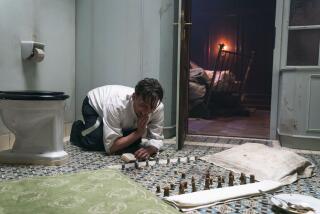Max Frisch; Influential Swiss Novelist, Playwright
- Share via
ZURICH, Switzerland — Max Frisch, a Swiss novelist and playwright who focused on the predicament of man in modern society, died Thursday. He was 79.
He succumbed to cancer at his Zurich home after a long illness, said his son, Hans Peter Frisch.
Frisch, considered the dean of German-language literature, was one of the most influential writers in the post-World War II era. His works, including “I Am Not Stiller” and “Man in the Holocene,” were translated into 37 languages.
“Andorra” and “The Firebugs,” his best-known plays, became standard theater repertory in many countries.
Written in the tradition of German Expressionism, the works dealt with the individual’s search for an identity and his striving to cope with bigotry and totalitarianism.
Frisch described himself as a pacifist and socialist but never joined a political party.
He won several literary awards.
In receiving the prestigious Peace Prize of the German book trade, he was cited for his “quiet perseverance in fighting abuse of power and ideological demagoguery and in defending the rights of the independently thinking, the minorities and the powerless ones.”
More recent awards included the University of Oklahoma’s Neustadt International Prize, with a citation that said his influence “on contemporary sensibility, not only of fellow writers, can hardly be overstated.”
Frisch was born May 15, 1911, the youngest child of a self-educated architect.
He studied German literature at Zurich University, and later, after three years working as a journalist, studied architecture at Zurich’s Technical University.
At that time, he decided to give up writing and burned all his early manuscripts because they failed to draw critical notice.
After his discharge from wartime service with the Swiss militia, he worked in an architect’s office but also resumed writing.
“The Wall of China” (1946), which deals surrealistically with the perils of dictatorship, was the first of his works to win international attention.
He wrote “I Am Not Stiller” in 1954, the story of a sculptor anti-hero who tries to shed his identity and take up a new life. He burned an early draft of the novel, written during his first stay in the United States in 1952, because he was not satisfied with it.
The masterpiece of his late years was “Man in the Holocene” (1980), the story of an old man who projects onto nature the sense of personal doom.
Frisch’s most widely known dramas included “The Firebugs” (1958), a powerful black-humor parable in which the philistine Herr Biedermann welcomes two arsonists to his house and sees it go up in flames.
“Andorra” (1961) symbolizes the destructiveness of prejudices by telling the story of Andri, mistakenly identified as a Jew. He chooses to die as a Jew rather than accept the Aryan identity that would have saved his life.
Frisch is survived by two former wives and three children.
More to Read
Sign up for Essential California
The most important California stories and recommendations in your inbox every morning.
You may occasionally receive promotional content from the Los Angeles Times.













